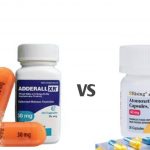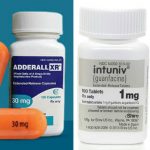Does Adderall Cause Acid Reflux?

Acid reflux happens when contents from your stomach move back up into your esophagus. This action is also called acid regurgitation or gastroesophageal reflux. If you have symptoms of acid reflux more than twice a week, you might have a condition known as gastroesophageal reflux disease (GERD).
According to the National Institute of Diabetes and Digestive and Kidney Diseases (NIDDK), GERD affects about 20 percent of people in the United States. If left untreated, it can sometimes cause serious complications.
The main mechanism of acid reflux is the abnormal functioning of the lower esophageal sphincter (LES), a ring of muscle that controls the opening between the esophagus and the stomach. Under normal circumstances, the LES opens and closes automatically to let food into the stomach and then close completely. Sometimes the lower esophageal sphincter doesn’t close all the way or in some way allows stomach acids produced in the stomach to slosh up into the esophagus. These acids then inflame the esophageal lining and cause the discomfort known as heartburn.
If a medication has the potential to cause heartburn, it will either be by directly irritating the lining of the esophagus or by relaxing the LES. In either case, the burning sensation is experienced in a similar way. Not all medications that can cause heartburn do cause it in all users of a particular medication.
What is Adderall?
Adderall is a combination of Dextroamphetamine and amphetamine used as part of a treatment program to control symptoms of attention deficit hyperactivity disorder (ADHD; more difficulty focusing, controlling actions, and remaining still or quiet than other people who are the same age).
Adderall is used to treat ADHD in adults and children 3 years of age and older. Adderall XR is used to treat ADHD in adults and children 6 years of age and older. Mydayis is used to treat ADHD in adults and children 13 years of age and older. Adderall is also used to treat narcolepsy (a sleep disorder that causes excessive daytime sleepiness and sudden attacks of sleep) in adults and children 12 years of age and older.
Adderall is in a class of medications called central nervous system stimulants. It works by changing the amounts of certain natural substances in the brain. Adderall also helps to boost energy levels and increase wakefulness, which could help people with narcolepsy, a sleep disorder causing excessive sleepiness. As the drug can boost levels of focus, some people use it to improve their performance in sports and study.
Does Adderall Cause Acid Reflux?
Yes, but it is not a common side effect. Surveys have reported acid among people who take Adderall, especially among women between the ages of 50-59 years old, who have been taking the drug for 10+ years. While there is no direct evidence to suggest that Adderall (amphetamine and dextroamphetamine) causes acid reflux, some people may experience gastrointestinal side effects, such as stomach pain, nausea, and vomiting, while taking Adderall. These side effects could potentially worsen acid reflux symptoms in some individuals. It’s important to discuss any concerns about Adderall or acid reflux with a healthcare provider, who can provide personalized advice and treatment options based on your individual needs and medical history.
In addition, drugs or foods that increase stomach acid or urinary acid can decrease the concentration of Adderall in the blood. While not strictly forbidden, acidifiers may make Adderall less effective as a therapy.
If Adderall is causing acid reflux or heartburn, talk to your healthcare provider before you change your dosage or decide to stop taking Adderall. Tell them about any other side effects you have experienced while taking the drug. If Adderall is not right for you, your healthcare provider may recommend other prescription medications for ADHD or natural alternatives.
Can you take heartburn medicine with Adderall?
No, avoid antacids and other alkalinizing agents, they increase absorption of Adderall and should be avoided. Substances that reduce stomach or urinary acid can increase the risk of Adderall’s side effects. The most common alkalinizing agents are antacids. They should be avoided outright when taking Adderall.
Can you take omeprazole with Adderall?
Talk to your doctor before using Adderall together with omeprazole. Combining these medications may affect the onset of effects of Adderall. Contact your doctor if your condition worsens or you experience increased side effects. Your doctor may be able to prescribe alternative treatments that do not interact.





